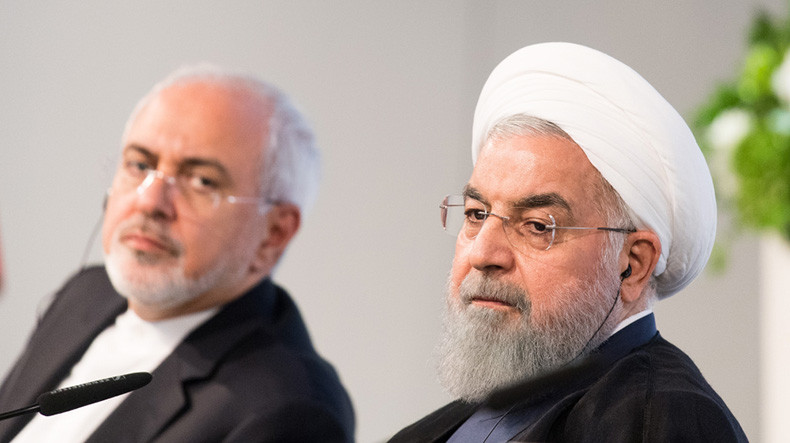
Iran: Rouhani rejects top diplomat Zarif's resignation
Iran's President Hassan Rouhani on Tuesday rejected the resignation of his Foreign Minister Javad Zarif, Al Jazeera reports, citing the presidential spokesperson.
Zarif did not give a reason when he announced his intention to quit on the social media platform Instagram on Monday night.
Zarif told the state-run Islamic Republic News Agency (IRNA) on Tuesday that he hoped his resignation "would spark the return of the ministry of foreign affairs to its constitutional place in [Iran's] international relations".
His remarks are believed to be linked to his absence in two separate meetings Syrian President Bashar al-Assad had on Monday with Rouhani and Iran's Supreme Leader Ayatollah Ali Khamenei.
Other internal disagreements over Iran's international policies were also reported to be the reasons behind his resignation.
Iranian officials and legislators called on Iran's top diplomat to stay, while some hardline voices expressed satisfaction with the move.
IRNA said 135 legislators of different political factions wrote a letter, petitioning for his return to the post.
Meanwhile, his announcement to step down was up for debate on social media.
The supporters of the regime change alongside the advocates of Iran's hardline conservative camp were somewhat content, as the supporters of the moderate-reformist faction sent their message of concern with the hashtag #Zarif_stay.
Tehran Stock Exchange recorded a drop of more than 2,000 points on Tuesday as rumours and reports about the resignation circulated rapidly on Iran's news outlets and social media.
Resignation over Instagram
Zarif announced his resignation on Instagram, which was officially confirmed by the foreign ministry. The announcement dominated the headlines a few hours after Assad's sudden visit.
In a speech broadcast on National TV, Rouhani said the Syrian president flew from Damascus to Tehran to thank "the Iranian nation, the Iranian government, the supreme leader of the revolution and also … the foreign ministry".
Later on Tuesday, Mahmoud Vaezi, the presidential chief of staff, said on Twitter that Rouhani's remarks were "clear evidence" of Rouhani's "complete satisfaction" with Zarif's stance and performance.
"From Dr Rouhani's point of view Iran has only one foreign policy and one foreign minister," he said.
Zarif publicised determination to resign came amid quarrels over Iran's foreign policy as well as a global struggle to preserve the 2015 nuclear deal, in which Tehran agreed to curb its nuclear programme in exchange for sanctions relief.
Fighting between parties and factions in Iran is a "deadly poison" in formulating foreign policy, Zarif said in an interview published by the Jomhuri Eslami newspaper on Tuesday, suggesting he may have resigned over pressure from hardline elements opposed to his role in negotiating the nuclear deal.
Mike Pompeo, US secretary of state, responded to Zarif's move, saying: "We'll see if it sticks."
He added in a Twitter post: "Our policy is unchanged - the regime must behave like a normal country and respect its people."
Israel's Prime Minister Benjamin Netanyahu hailed the move, writing in a Twitter post: "Zarif is gone. Good riddance."
In an effort to save the nuclear deal, Germany, the UK and France recently launched a financial entity to facilitate trade with Iran; it also hinges on FATF legislations.
'Horrified and upset'
Many Iranians see Zarif's resignation as yet another blow to the country's struggle to overcome the sanctions.
Sepideh, 24, said she was "horrified and upset" when she heard the foreign minister had stepped down.
"I don't have a good feeling," she told Al Jazeera. "I worry that people, including my family, could fail to make ends meet in this situation."
This comes at a time of growing pressure on Rouhani administration and his willingness to engage with the international community.
Hardline voices have been getting louder, calling for a change in political approach.
Related news
Newsfeed
Videos






























